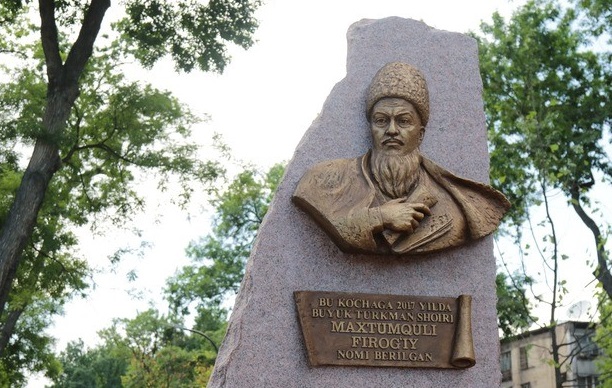The Uzbek memory of Pyragy, the great Turkmen poet
President Šavkat Mirziyoyev has called for a year of celebrations for the 300th anniversary of Magtymguly's birth, extolling his special contribution to the history and literature of all Turkic peoples. A film is also to be produced and an exhibition of artistic works illustrating the bonds of friendship and fraternity between the Uzbek and Turkmen peoples is to be held in Tashkent.
Tashkent (AsiaNews) - Celebrations have begun in Uzbekistan to mark the 300th birthday of the Turkmen poet and thinker Magtymguly Pyragy, which will culminate on May 18, the day of his birth in 1724 in a village on the banks of the Etrek River, today in the southwestern part of the Balkan velayat in Turkmenistan.
The son of another poet of the Sufi movement, Dovlettamed Azadi, as an adult he took the pseudonym Pyragy, 'the separated one', to emphasise his pilgrimage through the various Turkmen lands, and also the forced separation from the woman he loved.
A profound connoisseur of the Arabic and Persian languages, he is considered one of the fathers of the modern Turkic language, overcoming its dependence on Arabic-Persian metrics and approaching the language of the people.
Uzbek President Šavkat Mirziyoyev recalled this in the decree establishing the poet's jubilee, extolling 'his special contribution to the history and literature not only of the Turkic peoples, but of those of the entire world'.
Events in his honour will therefore be held in various countries, under the auspices of Unesco, whose cooperation is increasingly sought by the leadership and cultural representatives of Uzbekistan.
According to the official text, 'the works of Magtymguly Pyragy are imbued with profound humanism, expressed with unparalleled mastery of words, and illuminate the noblest values and qualities of the courageous Turkmen people, indomitable and work-loving, a true reference point for all and especially for the younger generations'.
Uzbekistan is one of the countries where Pyragy's poems are most widely read and passed on, recalling his studies in the famous Ko'kaldosh madrasa in Bukhara founded by the great Turkic writer Ali-Shir Nava'i, whose 16th-century building is still one of the testimonies to the greatness of the khanate heir to the great Tatar hordes and the development of the Ottoman Empire.
In Bukhara Magtymguly was able to gather many disciples, friends, admirers and supporters of his preaching, and large memorials in his honour have been built in Tashkent and Khiva, near Bukhara.
The committee for the celebrations is headed by the Prime Minister of Uzbekistan himself, Abdulla Aripov. New collections of the poet-philosopher's works will be published, as well as scientific articles dedicated to his life and creations.
The production of an artistic film is also planned, in collaboration between directors from Uzbekistan and Turkmenistan, and theatre performances will be staged on his life and activities.
An exhibition of artistic works illustrating the bonds of friendship and fraternity between the Uzbek and Turkmen peoples will be opened in Tashkent, and a major conference on the 'Role of Uzbekistan and Turkmenistan' will be held in Khiva.
An exhibition will be opened in Tashkent for artistic works illustrating the bonds of friendship and fraternity between the Uzbek and Turkmen peoples in Uzbek literature and art'. In October, the year of the poet will be concluded by a musical evening in the theatre of the 'Ali-Shir Nava'i' State Academy in Tashkent, also dedicated to the memory of Pyragy.
The poet had returned to his Turkmen homeland after his beloved Mengli had been stolen from him, bought at great cost by another family, and his older brothers had died during an ill-fated embassy to Sheikh Akhmed, one of the founders of the Afghan kingdom.
He married and had two much-loved children, symbolically named Sara and Ibrahim (Abraham), who sadly died at an unripe age. He then decided to leave home and spent over forty years wandering the Central Asian lands, stopping in the Mangyšlak peninsula on the Caspian Sea, then in Astrakhan and many other places, to be finally buried in Iran next to his father. His image also stands out on manats, Turkmen banknotes, and embodies the spirit of peoples who today wish to proudly reaffirm their identity.
13/02/2017 17:18
30/05/2018 10:32
30/04/2005
01/12/2023 10:09







.png)










